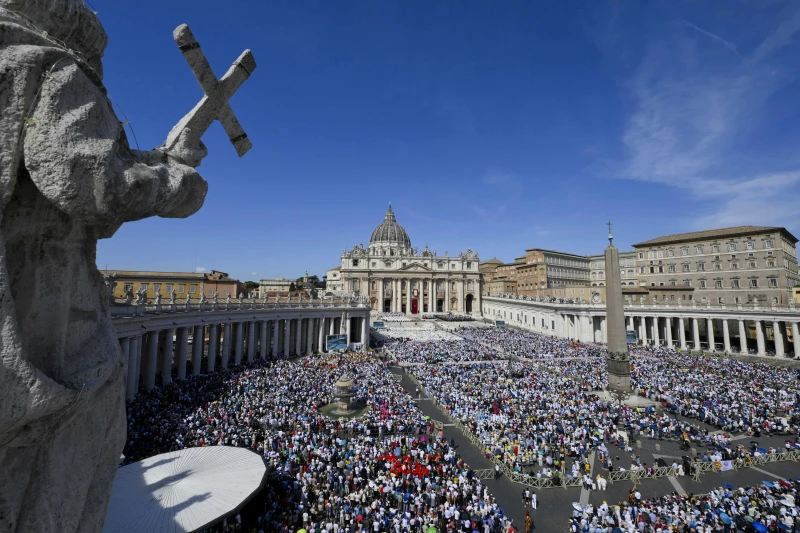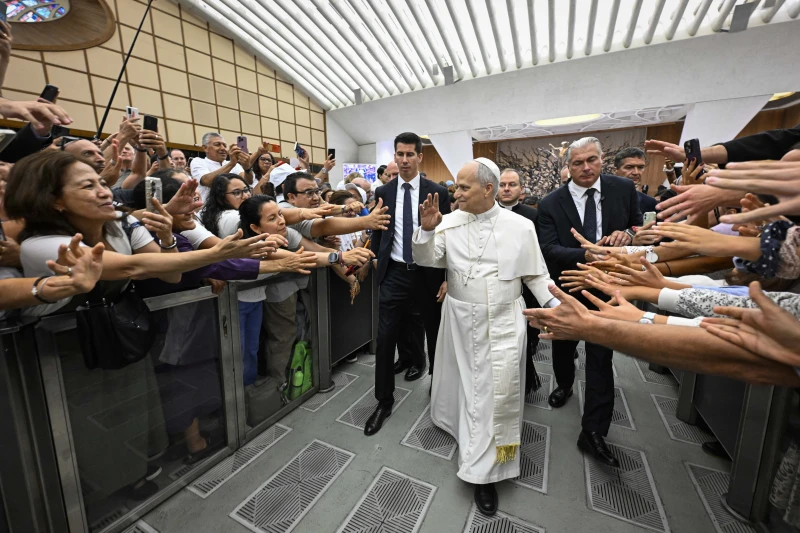

Pilgrims at the canonization Mass for Sts. Carlo Acutis and Pier Giorgio Frassati in St. Peter’s Square on Sept. 7, 2025. / Credit: Vatican Media
Washington, D.C. Newsroom, Sep 13, 2025 / 06:00 am (CNA).
Here is a roundup of Catholic world news from the past week that you might have missed:
‘Surge of enthusiasm’ among Catholic in Asia after St. Carlo Acutis canonization
Young Catholics in Asia are “experiencing a surge of enthusiasm” around the life of the newly canonized St. Carlos Acutis, according to the testimony of Father Will Conquer, a Paris Foreign Missions Society priest stationed in Cambodia, according to a Sept. 8 UCA News report.
“In Asia, where digital culture is omnipresent, Carlo Acutis stands out as a ‘saint 2.0,’” said Conquer, who added that the young saint’s life “resonates particularly in this region where young people, connected and searching for meaning, find in him an accessible and inspiring role model.”
Catholic leaders in Jerusalem gather for conference on property tax laws
The Assembly of Catholic Ordinaries of the Holy Land gathered at the Notre Dame Center in Jerusalem on Sept. 10 for a “high-level conference dedicated to the Arnona property tax issue,” the Latin Patriarchate of Jerusalem said in a Sept. 12 press release.
The conference comes after the Jerusalem Municipality’s decision to impose the Arnona municipal property tax on church properties, breaking with the historic status quo that has exempted Christian churches in the Holy Land from paying property taxes since the Ottoman Empire.
According to the release, the conference opened with a keynote address by Latin Patriarch Cardinal Pierbattista Pizzaballa, who “emphasized that the status quo regarding the Arnona tax has come to an end and that change is inevitable.” Pizzaballa further called for leaders among the assembly to unite and “for institutions to prepare themselves collectively and responsibly for the upcoming changes.”
Catholic charity delivers water to South Korean city plighted by drought
A charity organization called the Catholic Medical Angels has delivered 10 tons of water to the coastal city of Gangneung in South Korea, where rapidly declining water levels in the city’s Obong Reservoir has prompted a water crisis, according to a report from UCA News.
“Though it is a small effort, we hope it helps the citizens of Gangneung and that this severe drought is resolved as soon as possible,” said Min Chang-Ki, director of the Catholic Medical Center, which oversees the Catholic Medical Angels.
The delivery took place on Sept. 3 and was carried out at parishes across the local Chuncheon Diocese. The diminishing reservoir ordinarily supplies about 87% of the city’s tap and industrial water, the report said.
Filipino priest to receive Nobel Prize of Asia for opposition toward former president
Filipino priest Father Flavie Villanueva will receive the Ramon Magsaysay Award, often referred to as the “Nobel Prize of Asia,” for his work building shelters for Manila’s homeless population and “defending victims of extrajudicial killings” in former Philippine President Rodrigo Duterte’s drug crackdown, according to Crux.
“I accept this on behalf of the thousands of homeless and those victims of social injustice, particularly the EJK victims, that they may have a face in this fast-changing world,” Villanueva said in a press conference on Wednesday. He will receive the award officially in a ceremony on Nov. 7.
Catholics in Nepal hoping for an end to violence amid corruption protests
Catholics in Nepal are hoping for an end to ongoing violence, according to Nepal priest Father Silas Bogati, after anti-corruption protests in the country escalated on Sept. 6, resulting in the deaths of at least 22 people, according to a Sept. 10 Crux report.
“Violence is never a solution to problems, and now we hope there will be peaceful transition and people can live in peace,” the priest said. “For the Catholic Church, we want to see the end of violence and arson attacks and get a peaceful solution to the ongoing problems.”
The priest’s words come after “a full curfew” was enacted following Saturday’s unrest, which was ignited by social media bans across the country.
Read More
